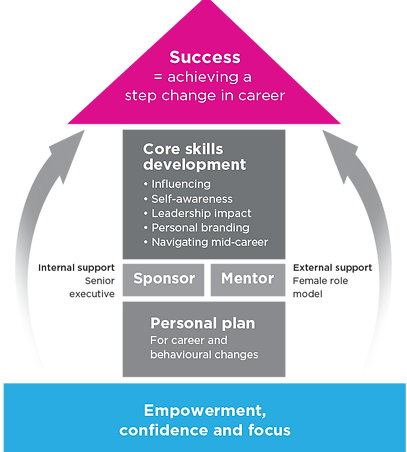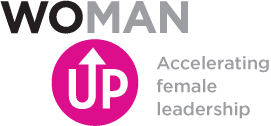WoW – a different type of female
leadership programme
WoW researched and ran an innovative pilot leadership programme which commenced in January 2016 and ran for the full course of the calendar year.
We set out to design and test a leadership programme that would deliver maximum impact in a short time frame. We focused on young female leaders at middle management level. Several studies have shown this stage to be one of the weakest links in the female leadership pipeline. We wanted to test if a set of practical interventions at this vulnerable point would make a difference.
We began with a 360° degree analysis of the barriers to female leadership already highlighted in academic and other research sources. This showed us that traditional mentoring programmes were failing to deliver real benefits for women.

The research also identified the importance of:
-
Senior female executives who would become role models for younger women and provide unbiased support.
-
Sponsors within the business who would actively champion younger women to address the predominant issue of male-dominated corporate culture.
-
Action-focused career planning with astrong emphasis on developing confidence.
THE MODEL
Based on this research, we built our pilot mentoring programme around a “triad model”. Supporting the female mentee would be a successful female mentor, who would be external to the mentee’s workplace.
Her role would be to provide unbiased support and create a safe space throughout the mentoring relationship. A sponsor, a senior executive level within the mentee’s business, would also provide support, increase their visibility within the business and provide “stretch” opportunities within the business.
This core model was combined with:
-
A career planning process, to address evidence that women are less inclined to plan their careers and are less confident than men.
-
A mentee support programme to enhanceconfidence and develop critical skills.
We decided to measure the impact of what we were doing through surveys before, during and after the programme. This multi-faceted approach contributed to WoW's impact. We don’t believe that one element on its own would have delivered such an impact.
CAREER STEP CHANGE
A day-long goal setting workshop kicked off the programme. Drawing on the latest in brain science research, our mentees were challenged to decide what they wanted to achieve over the next 12 months. Only those prepared to make a ‘step change’ in their careers were invited to stay. We wanted them to take risks, to stretch themselves and go for goals that would excite and scare them in equal measure.
As well as focusing on what they wanted to achieve, we spent time probing and encouraging our mentees to reflect on any default behaviours and mindsets that had the potential to sabotage their success. Examples include “not speaking up at meetings”, “not taking risks” and “I’m not good enough”.
We shared the concept of brain plasticity and how — by thinking and acting in different ways — they could change the wiring of their brains to support rather than hinder their efforts.
The approach was holistic. The mentees had to reflect on all aspects of their lives and set goals in areas that can often be neglected, especially in this mid-career phase. We stressed that setting goals that looked after their physical and mental well-being were vital.
The mentees left with a simple one-page plan. On it was the SMART (specific, measurable, attainable, relevant and timely) career and “other” goals for the next 12 months. The plan included key behaviours — and importantly the mindset change — they needed to focus on to set them up for success.
PROGRAMME ROLL OUT
That one-page plan became the blueprint for the mentoring relationship. Our 27 mentors received the WoW guidelines and attended a training event on the WoW programme and on effective mentoring.
They were asked to commit to four mentoring sessions. All did but a third exceeded that number. The mentoring was combined with developmental sessions for mentees on themes we knew from our research impacted on confidence, career planning and visibility within their companies. The themes were:
-
Influencing
-
Self-awareness
-
Leadership impact
-
Personal branding
-
Navigating mid-career
We believed that sponsors within the organisation in which they worked were critical to our mentees achieving their goals. We crafted a clear role description for sponsors and created guides for them and suggestions on how to champion the mentees.
Read about the outcomes of the programme
Find out about WoW's own learnings
